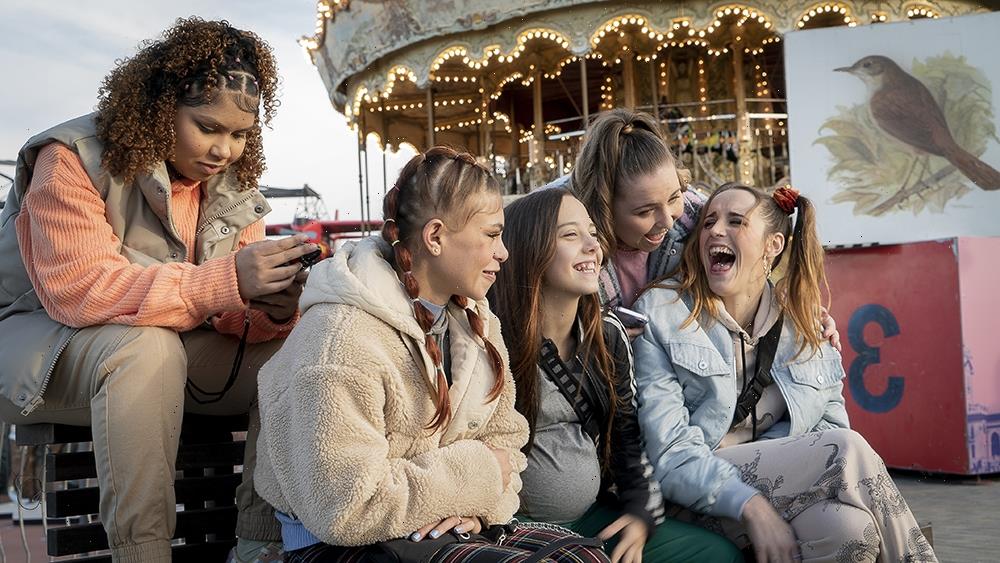
San Sebastian Festival’s 2022 Spanish Film Lineup: Emerging Talent, Fresh Titles From a New Establishment
07/15/2022Fernando Franco’s coming of age drama “The Rite of Spring” and Mikel Gurrea’s rural drama “Suro” will vie for the top Golden Seashell at September’s 70th San Sebastian Festival, the highest-profile film event in the Spanish-speaking world.
Also making the cut are Jaime Rosales’s female emancipation tale “Wild Flowers” and Pilar Palomero’s teen motherhood story “La Maternal.”
The four titles form part of a Spanish film line-up which looks to be “the strongest Spanish movie presence at San Sebastian in the 11 years I’ve been directing the festival,” San Sebastian director José Luis Rebordinos said on Friday.
One or two more Spanish films could still be added to the selection, including one more in New Directors, he went on.
Galvanizing the selection is new talent. Five of the 10 movies in San Sebastian’s principal sections for new movies – main competition, out of competition, special screenings, New Directors and Zabaltegi-Tabakalera – are first or second features.
Spanish cinema has already impacted at Berlin and Cannes. “Alcarràs,” from Catalonia’s Carla Simón, won Berlin’s top Golden Bear in February. “One Year, One Night,” from Catalan Isaki Lacuesta, also played in main competition. This May “Pacifiction,” from Albert Serra, another Catalan, scored a competition berth at Cannes. Thanks to these three titles, just Catalonia, one part of Spain had more directors this year in the key section at Europe’s two biggest festivals than Italy (2), Germany (1) or the U.K. (none at all).
Announced Friday at a traditional Madrid press conference, with the exception of robust auteurs of relataionship dramas such as Rosales and Franco, most Spanish titles in this year’s selection cut two ways: Led by Alberto Rodriguez and Rodrigo Sorogoyen, one is formed by a new establishment of directors born in the 1970s with an acute sense of sub-genre – whether jailbreak thriller, sci-fi dystopia or stranger-in-town Western – or doc-fiction borderlands, as in Lacuesta’s highly documented “One Year, One Night.”

Another is a newer – and often female – generation of cineastes, born from 1980, such as Palomero, Gurrea or López Riera, helming pan-regional or international co-productions grounded in authentic local realities, but alert to broader social trends.
Money for Spanish movies is now sluicing into the film industry from bigger production entities who produce heavily for global streamers – The Mediapro Studio, Bambu Producciones, going forward, foreseeably, Morena Films.
Eight of Netflix’s 20 most watched non-English series and movies are from Spain, including three of its six most popular films. That represents not only an injection of money but also confidence for its directors who now move fluidly from film to TV work.
Movistar Plus, the Spanish pay TV/SVOD arm of telco giant Telefonica, has also emerged as a national champion, producing fiction made by open audience auteurs, often with a social point – exactly the kind of cinema that has often been selected at San Sebastián. It is no, coincidence, in this regard that the one TV series chosen this year is anthology title “Apagón,” helmed by five directors, four of which also have movies at the Spanish festival.
A quick breakdown of titles:
MAIN COMPETITION
“La Maternal,” (Pilar Palomero, Spain)
The second feature from Palomero, whose feature debut “Schoolgirls” scooped the 2021 Spanish Academy Best Picture “Goya.” Fleeing social ostracism, Carla, 14, pregnant, arrives at La Maternal teen mother shelter, while navigating an unstable and destructive relationship with her mother. Produced like “Schoolgirls” by Spain’s Inicia Films, whose credits also include Carla Simon’s “Summer 1993,” and BTeam Productions.
“The Rite of Spring,” (“La Consacración de la Primavera,” Fernando Franco, Spain)
Ana begins university in Madrid and, in a life-defining development, befriends David, who has cerebral palsy. A coming of age third feature from Franco who carved out a reputation with 2013 San Sebastian double winner “The Wound” and 2017’s “Dying” for both psychological acuity and uncompromising honesty treating the discomfiting and taboo. This film looks sunnier. Ferdydurke Films, Kowalski Films and Lazona Films produce.
“Suro,” (“Cork,” Mikel Gurrea, Spain)
Arguably Spain’s most awaited feature debut of the year, hitting San Sebastian with large buzz. A young middle-class couple move to their family cork plantation and rile local inhabitants as a “Straw Dogs” set-up evolves into a probing examination of capitalism and the right to private property. Barcelona’s Lastor Media and Malmo Pictures and San Sebastian’s Irusoin produce.

“Wild Flowers,” (“Girasoles Silvestres,” Jaime Rosales, Spain, France)
Produced by Fresdeval, A Contracorriente, Oberón and France’s Luxbox, with Anna Castillo (“El Olivo”) playing a threatened mother of two. Reportedly the broadest audience play yet from “Beautiful Youth” director Rosales, a Cannes regular and insistent maverick.
OUT OF COMPETITION
“Offworld,” (“Apagón,” Rodrigo Sorogoyen, Raúl Arévalo, Isa Campo, Alberto Rodríguez, Isaki Lacuesta)
A solar storm sparks a global power outage. Five episodes of an anthology series – whose episodes are separate, target different audiences but set in the same context – explore the consequences as characters confront their basic needs and basest instincts. Movistar Plus’ first original to explore global dystopia and Buendía Estudios’ first full production for the Telefonica Spanish pay TV operator.
“Prison 77,” (“Modelo 77,” Alberto Rodríguez, Spain)
Aso from Movistar Plus and San Sebastian’s opening movie. In 1977, a young accountant (Miguel Herrán, “Money Heist,” “Elite”) is sent to Barcelona’s legendary Modelo penitentiary where a grizzled con (Javier Gutiérrez, “Below Zero”) plans a jail break. An action thriller based on true events serving comment, like “Marshland,” on Spain’s transition to democracy which passed part of Spain by. Co-produced by Atípica Films, Rodríguez’s career-long producer.
SPECIAL SCREENINGS
“El sastre groc,” (Isabel Coixet, Spain)
The latest film from the director of “The Secret Life of Words,” a gender politics doc feature. In 2018, nine women file formal complaints against two teachers at Lleida’s Aula de Teatro for sexual abuse occurring over 2001-08. The denunciations were rejected because of case prescription but may well still have proved in some ways a game changer.
“To Books and Women I Sing,” (“A los libros a las mujeres canto,” Maria Elorza, Spain)
A first doc feature from Elorza, a well-known figure on the San Sebastian film scene, about women’s relation to books and oral literature.
ZABALTEGA-TABAKALERA
“Piggy,” (“Cerdita, Carlota Pereda, Spain, France)
For many, Spain’s feature debut of the year, a Sundance breakout and fulsome sales and critical hit. “Spanish helmer Carlota Pereda’s formidable debut draws its terror from the same well of adolescent female insecurity as ‘Carrie,’ before going its own grisly way,” Guy Lodge wrote in his Variety review.
“Chords,” (“Cuerdas,” Estibaliz Urresola, Spain)
A doc short from on-the-rise Basque helmer Urresola, about a difficult ethical choice confronting a woman’s choir, as she preps her fiction feature debut, “20,000 Species of Bees,” about the family of a transsexual minor.
“The Water,” (“El Agua,” Elena López Riera, Switzerland, France, Spain)
Another standout 2022 debut, world premiering at Cannes Directors’ Fortnight, a romantic drama set in a village in Spain’s deep South-East combining grounded realities and dark lore which threatens a young girl’s flowering summer love story.
“Third Notebook,” (“Hirugarren Koadernoa,” Lur Olaizola, Spain)
The third short from Olaizola, audiovisual program co-ordinator at San Sebastian’s vibrant Tabakalera culture center, a doc recording actor Ana Torrent and a filmmaker as Torrent reads extracts from the diary of María Dolores Gonzalez Katarain, “Yoyes,” during her exile in Mexico, before being assassinated in 1986 for abandoning ETA.
PERLAK
“God’s Crooked Lines,” (“Los Renglones Torcidos de Dios,” Oriol Paulo, Spain)
Creator of mind-bending suspense thrillers (“The Invisible Guest,” “Mirage”), Paulo returns with a period mystery tale set in a psychiatric ward. Nostromo Pictures produces. Playing out of competition, the film closes the sidebar.
“The Beasts,” (“As Bestas,” Spain, France)
The stranger-in-town Western, starring France’s Denis Menochot and Marina Fois as a French couple which settles in a Galician village, its cosmopolitan modernity affronting local inhabitants’ sense of self. Directed with Sorogoyen’s arresting long-shot flare, a film about how men – and, in explicit contrast, women – negotiate conflict.

“One Year, One Night” (“Un año, una noche,” Isaki Lacuesta, Spain)
A step-up in scale for Lacuesta, starring Nahuel Pérez Biscayart (“BPM”) and Noémie Merlant (“Portrait of a Lady on Fire”), a heavily documented but highly emotional record of the trauma wrought on a Spanish-French couple who survived Paris’ Bataclan night club massacre. Lead produced by Bambu’s Mr Fields and Friends and France’s Noodles Production as the Studiocanal-backed Bambu drives into movies of commercial ambition and auteurist creation.
VELODROMO
“Black is Belta II: Ainhoa” (Fermin Muguruza, Spain)
The sequel to Muguruza’s 2018 animated feature, following Ainhoa, the daughter of Manex, the previous film’s protagonist,
in a late Cold War journey through Lebanon, Afghanistan and Marseille as she becomes embroiled in the international narcotics trade. Talka Records & Films produces with BIB2 Ainhoa, Lagarto Cine, Draftoon Studio.
“Rainbow,” (Paco Leon, Spain)
A Netflix original produced by Mediaset España’s Telecinco Cinema and inspired by “The Wizard of Oz” which marks a step-up in ambition and budget for popular actor and director León. A modern-day teen Dorothy marks on a journey to discover why her long-lost mother disappeared.
“Feeling It,” (“Sintiéndolo Mucho,” Fernando León de Aranoa, Spain)
One year after the Oscar-shortlisted “The Good Boss,” Leon De Aranoa is back at San Sebastián with “Feeling it,” a doc feature portrait of Spanish singer-songwriter Joaquín Sabina, 13 years in the making, depicting “the artist, his best and worst moments, and his personality, so linked to his work, his creativity,” Leon de Aranoa told Variety. A Reposado, BTF Media, Sony Music Spain production.

Source: Read Full Article

